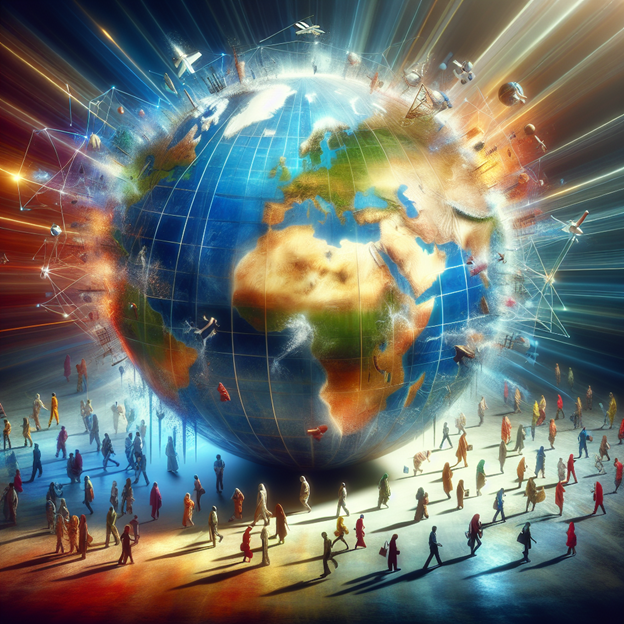In recent years, the global political landscape has undergone significant transformations, reshaping governance, autonomy, and the very fabric of international cooperation. As an observer and analyst of these shifts, I’ve witnessed firsthand the complex interplay of forces driving these changes. From the rise of decentralization movements to the challenges posed by digital surveillance, these dynamics offer a fascinating glimpse into the evolving nature of power and resistance in the 21st century.
Decentralization movements and their quest for autonomy
Political movements seeking autonomy are increasingly challenging centralized power structures globally. This push for decentralization is not confined to a single region or country; rather, it’s a worldwide phenomenon that impacts politics, governance, and the quest for self-determination. These efforts to decentralize power are reshaping the way governments and societies operate, advocating for a governance model that is more responsive to local needs and aspirations. The implications of this shift are profound, as they not only challenge existing power dynamics but also offer new possibilities for autonomy and self-governance.
The backlash against international institutions and its effects on global cooperation

Political movements driving backlash against global institutions are hindering efforts toward international cooperation. This backlash is not merely a reaction to globalization or economic factors; it’s also a reflection of deeper discontent with how global institutions are perceived to influence national sovereignty and local cultures. This sentiment is disrupting worldwide political stability and unity, as it fuels skepticism and resistance against international bodies designed to foster cooperation and address global challenges. The resulting tension poses a significant challenge to the very idea of a united global community working towards common goals.
Rise of far-right movements in Europe and America
The rise of far-right movements is reshaping Europe’s political landscape, with similar trends observed in America. These movements, characterized by their nationalist, anti-immigration, and often xenophobic ideologies, are influencing political discourse and policy-making on both sides of the Atlantic. The global impact of America’s far-right surge, in particular, demonstrates how political movements within a powerful nation can have far-reaching effects, influencing political ideologies and movements worldwide. This rise reflects broader societal anxieties and discontent, challenging traditional political establishments and norms.
The impact of diaspora communities on homeland politics
Diaspora communities significantly fund political movements in their homelands, leveraging their resources and networks to influence political outcomes. Expatriates’ engagement in homeland politics is not merely a matter of financial contributions; it also includes active participation in international political movements, advocacy, and lobbying. This influence underscores the interconnected nature of our world, where political dynamics in one country can be shaped by the actions and decisions of its diaspora, living thousands of miles away.
Shifts in political ideology due to migration crises
Migration crises are fueling the rise of right-wing political movements globally. As countries grapple with the complexities of migration, political movements are adapting their ideologies, often incorporating anti-immigration and nationalist sentiments to garner support. This adaptation reflects a broader shift in political discourse, where migration is increasingly framed as a security, economic, and cultural threat. Such framing not only influences domestic policies but also impacts international relations, as countries adopt more stringent measures to control migration.
The role of non-state actors in shaping international norms

Political movements influence global governance beyond state-centric frameworks, with non-state actors playing a pivotal role in redefining political norms. These actors, ranging from NGOs to multinational corporations and insurgent groups, wield significant power in shaping policies, public opinion, and even the outcomes of conflicts. Their ability to operate across borders and mobilize resources and support globally challenges traditional notions of sovereignty and governance, impacting worldwide political effects in profound ways.
The resurgence of nationalism and its global implications
The resurgence of nationalism is reshaping global political movements and alliances. Nationalist political movements, emphasizing sovereignty, cultural identity, and self-determination, are influencing worldwide policies and diplomatic relations. This resurgence often manifests in protectionist policies, skepticism towards international cooperation, and a reevaluation of alliances, potentially altering the global order that has prevailed since the end of the Second World War. The implications of this shift are vast, affecting trade, security, and the international legal framework.
The effectiveness of sanctions as a political tool
Sanctions influence political movements, shaping the global political landscape in significant ways. As a tool of statecraft, sanctions aim to compel changes in behavior without resorting to military force. However, political movements adapt to these pressures, challenging the effectiveness of sanctions worldwide. The resilience and adaptability of targeted states or groups often lead to unintended consequences, diminishing the impact of sanctions and raising questions about their utility as a political tool. This dynamic underscores the complexity of leveraging economic measures to achieve political ends.
How digital surveillance is reshaping state control and opposition
Digital surveillance bolsters state power over political movements globally, offering governments unprecedented capabilities to monitor, influence, and counteract opposition. This technological shift has profound implications for civil liberties, privacy, and the very nature of dissent. Simultaneously, opposition groups are leveraging technology to mobilize against surveillance, using digital tools to organize, spread their message, and evade state control. This cat-and-mouse game between states and political movements highlights the dual-edged nature of technology in modern governance and resistance.
The worldwide political effects of these dynamics are profound, touching every aspect of governance, society, and international relations. As these trends continue to evolve, they will undoubtedly shape the future of politics in ways that are currently difficult to predict. What remains clear, however, is that the interplay of decentralization, backlash against global institutions, the rise of far-right movements, diaspora influences, migration crises, the role of non-state actors, nationalism, sanctions, and digital surveillance will continue to be critical factors in understanding and navigating the global political landscape.




